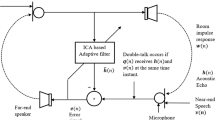Abstract
Acoustic echo cancellation is one of the most severe requirements in hands-free telephone and teleconference communication. This paper proposes an Empirical Mode Decomposition (EMD)-based sub-band adaptive filtering structure, which applies the EMD-based algorithm dealing with the far-end speech signal and the microphone output to obtain two sets of intrinsic mode functions (IMFs). In addition, each IMF set is separated into different bands based on the power spectral density (PSD) of every IMF. Experiment signals were collected from a medium-size office room and simulations were taken under different conditions by three types of EMD-based algorithms. Results show that the proposed structure is able to model the transfer function of the unknown environment and track the change of the room much faster than the normalized adaptive filtering structure. The ensemble EMD (EEMD) algorithm and the noise-modulated EMD (NEMD) are proved to have better performance than the EMD algorithm in terms of echo return loss enhancement.






Similar content being viewed by others
References
Asif, I. M., & Grant, S. L. (2008). Novel variable step size NLMS algorithms for echo cancellation. In ICASSP (pp. 241–244).
Azpicueta-Ruiz, L. A., Zeller, M., Arenas-Garcia, J., & Kellermann, W. (2009). Novel schemes for nonlinear acoustic echo cancellation based on filter combinations. In ICASSP (pp. 193–196).
Benesty, J., & Gay, S. L. (2002). An improved PNLMS algorithm. In ICASSP (pp. 1881–1884).
Burton, T. G., Goubran, R. A., & Beaucoup, F. (2009). Nonlinear system identification using a subband adaptive Volterra filter. IEEE Transactions on Instrumentation and Measurement, 1389–1397.
Chatlani, N., & Soraghan, J. J. (2012). EMD-based filtering (EMDF) of low-frequency noise for speech enhancement. IEEE Transactions on Audio, Speech, and Language Processing, 1158–1166.
Gilloire, A. (1987). Experiments with sub-band acoustic echo cancellers for teleconferencing. In ICASSP (pp. 2141–2144).
Jin, Q., Luo, Z. Q., & Wong, K. M. (1996). Optimum filter banks for signal decomposition and its application in adaptive echo cancellation. IEEE Transactions on Signal Processing, 1669–1680.
Khan, J. F., Adhami, R. R., Bhuiyan, S. M. A., & Barner, K. E. (2008). Empirical mode decomposition based interest point detector. In ICASSP (pp. 1317–1320).
Ma, B. S., Dong, H., & Zhu, Y. S. (2011). An improved subband adaptive filter for acoustic echo cancellation application. Advanced in Control Engineering and Information Science, 2244–2249.
Mijovic, B., Vos, M. D., Gligorijevic, I., Taelman, J., & Hufffel, S. V. (2010). Source separation from single-channel recordings by combining empirical-mode decomposition and independent component analysis. IEEE Transactions on Biomedical Engineering, 2188–2196.
Molla, M., Tanaka, T., & Rutkowski, T. M. (2012). Multivariate EMD based approach to EOG artifacts separation from EEG. In ICASSP (pp. 653–656).
Navarro, X., Poree, F., & Carrault, G. (2012). ECG removal in preterm EEG combining empirical mode decomposition and adaptive filtering. In ICASSP (pp. 661–664).
Ni, J., & Li, F. (2010). Adaptive combination of subband adaptive filters for acoustic echo cancellation. IEEE Transactions on Consumer Electronics, 1549–1555.
Ohta, S., Kajikawa, Y., & Nomura, Y. (2007). Acoustic echo cancellation using sub-adaptive filter. In ICASSP (pp. 85–88).
Sugiyama, A. (2009). A robust NLMS algorithm with a novel noise modeling based on stationary/nonstationary noise decomposition. In ICASSP (pp. 201–204).
Taghia, J., & Taghia, J. (2008). One-channel audio source separation of convolutive mixture. Advances in Computer and Information Science and Engineering, 202–206.
Topa, M. D., Muresan, I., Kirei, B. S., & Homana, I. (2010). Digital adaptive echo-canceller for room acoustics improvement. Advances in Electrical and Computer Engineering, 50–53.
Tsui, P. H., & Chang, C. C. (2010). Noise-modulated empirical mode decomposition. Advances in Adaptive Data Analysis, 25–37.
Wu, Z. H., & Huang, N. E. (2009). Ensemble empirical mode decomposition: a noise assisted data analysis method. Advances in Adaptive Data Analysis, 1–41.
Zhang, Q., Que, P. W., & Liang, W. (2008). Applying sub-band energy extraction to noise cancellation of ultrasonic NDT signal. Journal of Zhejiang University, 1134–1140.
Acknowledgements
This work was supported by the Natural Sciences and Engineering Research Council (NSERC) and industrial and government partners, through the Healthcare Support through Information Technology Enhancements (hSITE) Strategic Research Network.
Author information
Authors and Affiliations
Corresponding author
Rights and permissions
About this article
Cite this article
He, X., Goubran, R.A. & Liu, P.X. A novel sub-band adaptive filtering for acoustic echo cancellation based on empirical mode decomposition algorithm. Int J Speech Technol 17, 37–42 (2014). https://doi.org/10.1007/s10772-013-9203-7
Received:
Accepted:
Published:
Issue Date:
DOI: https://doi.org/10.1007/s10772-013-9203-7




